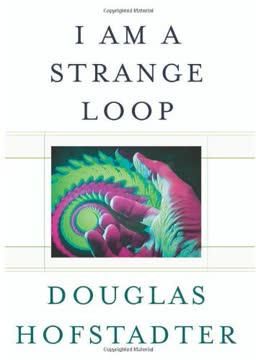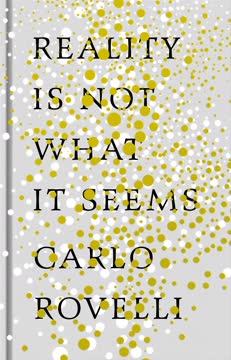Key Takeaways
1. Our perceptions evolved for fitness, not truth
Perception is not about truth, it's about having kids.
Evolution shapes perception. Natural selection favors perceptions that enhance fitness—the ability to survive and reproduce—rather than those that accurately represent objective reality. This principle applies across species, from insects to humans. For example, male jewel beetles mistake beer bottles for potential mates, demonstrating that even fundamental perceptions like recognizing a mate can be based on fitness-enhancing heuristics rather than true representations of reality.
Fitness trumps truth. The Fitness-Beats-Truth (FBT) Theorem mathematically proves that perceptions tuned to fitness will, in almost all cases, drive perceptions tuned to truth to extinction. This counterintuitive result challenges our intuitive belief that seeing reality accurately would be most advantageous for survival. Instead, our perceptions are more like a species-specific user interface, hiding complex truths behind simple icons that guide adaptive behavior.
2. The interface theory of perception: Reality as a user interface
Spacetime is our desktop, and physical objects, such as spoons and stars, are icons of the interface of Homo sapiens.
Our perceptions are like a computer interface. Just as a desktop interface on a computer hides the complex reality of circuits and code behind simple icons, our perceptions present a simplified view of reality optimized for our survival and reproduction. The objects we perceive—trees, rocks, other people—are not faithful representations of objective reality but rather adaptive shortcuts, like icons on a desktop.
The interface hides complexity. This view explains why our perceptions can be simultaneously useful and misleading. For example, we perceive a table as solid, even though physics tells us it's mostly empty space. This "illusion" is useful for interacting with the world, even if it's not strictly true. Similarly, our perception of color doesn't reflect an objective property of objects but rather a useful way of categorizing and interacting with our environment.
3. Evolutionary game theory proves veridical perception is unfit
The probability is zero that we see reality as it is.
Mathematical proof against veridical perception. Using evolutionary game theory, the FBT Theorem demonstrates that organisms whose perceptions more accurately track fitness payoffs will outcompete those whose perceptions more accurately represent objective reality. This result holds even for simple perceptual systems and becomes more pronounced as complexity increases.
Implications for science and philosophy. This theorem challenges foundational assumptions in many fields, including cognitive science, neuroscience, and philosophy of mind. It suggests that our scientific theories, while useful, may be fundamentally limited by the constraints of our perceptual systems. This doesn't mean science is futile, but rather that we should be cautious about assuming our best theories reflect objective reality.
4. Spacetime and objects are data structures, not objective reality
Spacetime is just a format our senses use to report fitness payoffs and to correct errors in these reports.
Spacetime as a data structure. Rather than being fundamental aspects of reality, space and time may be best understood as data structures our minds use to organize and process information about fitness payoffs. This view aligns with recent developments in physics, such as the holographic principle, which suggests that the information contained in a volume of space can be described by information on its surface.
Objects as fitness payoffs. Physical objects, in this view, are not objective entities but rather representations of clusters of fitness payoffs. For example, an apple isn't a "real" object that exists independently of perception, but a useful way of packaging information about potential energy gain, manipulation affordances, and other fitness-relevant factors.
- This explains phenomena like change blindness, where significant changes in a visual scene can go unnoticed
- It also accounts for the effectiveness of visual illusions, which exploit the heuristics our perceptual systems use
5. Quantum physics supports non-realist interpretations of reality
Quantum mechanics evidences that there is no such thing as a mere 'observer (or register) of reality.' The observing equipment, the registering device, 'participates in the defining of reality.'
Quantum mechanics challenges realism. Experiments in quantum physics, such as the double-slit experiment and tests of Bell's inequalities, suggest that the act of observation plays a crucial role in determining reality. This aligns with the interface theory of perception, suggesting that what we perceive as reality may be fundamentally shaped by the act of perception itself.
Implications for consciousness and reality. These findings in quantum physics support interpretations of reality that give a central role to consciousness or observation. This doesn't necessarily mean reality is subjective, but it does suggest that the relationship between consciousness and the physical world may be more fundamental than previously thought.
- Quantum entanglement and non-locality challenge our intuitions about space and time
- The measurement problem in quantum mechanics suggests a deep connection between observation and reality
6. Consciousness is fundamental, not emergent from physical matter
Consciousness does not arise from matter; this is a big claim that we will explore in detail. Instead, matter and spacetime arise from consciousness—as a perceptual interface.
Consciousness as fundamental. Instead of trying to explain how consciousness emerges from physical matter, this theory proposes that consciousness is a fundamental aspect of reality. Physical matter and spacetime are then understood as constructs within consciousness, rather than the other way around.
A network of conscious agents. In this view, reality consists of a vast network of interacting conscious agents. These agents range from simple to complex, with human consciousness being just one type among many. This perspective offers a new approach to longstanding problems in philosophy of mind, such as the hard problem of consciousness.
- This theory is mathematically formalized, allowing for scientific testing and refinement
- It potentially unifies disparate areas of inquiry, from quantum physics to cognitive science
7. A new scientific theology: Precise theories of infinite conscious agents
We can foster what might be called a scientific theology, in which mathematically precise theories of God can be evolved, sharpened, and tested with scientific experiments.
Bridging science and spirituality. This approach offers a way to bring rigorous scientific methods to bear on questions traditionally considered the domain of religion or spirituality. By formalizing concepts like infinite conscious agents, it becomes possible to develop testable theories about the nature of reality and consciousness.
Implications for human understanding. This scientific theology could potentially transform our understanding of ourselves and our place in the universe. It suggests a way to reconcile scientific and spiritual worldviews, offering a path to explore profound questions about existence, purpose, and the nature of reality using the tools of modern science.
- This approach could lead to new insights in fields ranging from artificial intelligence to cosmology
- It challenges us to reconsider fundamental assumptions about the nature of reality and consciousness
Last updated:
FAQ
What's The Case Against Reality about?
- Core Thesis: The book argues that our perceptions are not reflections of objective reality but evolved interfaces that prioritize survival over truth.
- Evolutionary Perspective: Hoffman introduces the Fitness Beats Truth (FBT) theorem, suggesting that natural selection favors perceptions that enhance survival rather than accuracy.
- Interface Theory of Perception: It presents the idea that our senses act like a computer interface, simplifying reality to help us navigate the world.
Why should I read The Case Against Reality?
- Challenging Assumptions: The book invites readers to question deeply held beliefs about perception and reality, making it thought-provoking for those interested in philosophy and science.
- Interdisciplinary Insights: Hoffman integrates concepts from evolutionary biology, cognitive science, and physics, offering a comprehensive view of perception.
- Practical Applications: The ideas can be applied to fields like marketing and design, emphasizing the role of perception in decision-making.
What are the key takeaways of The Case Against Reality?
- Perception as an Interface: Our senses provide an interface shaped by evolutionary pressures, prioritizing fitness over accuracy.
- FBT Theorem: The theorem asserts that perceptions enhancing survival are favored, challenging the notion of veridical perception.
- Spacetime and Objects: The book argues that spacetime and objects are constructs of our perceptual interface, not fundamental realities.
What is the Interface Theory of Perception (ITP)?
- User Interface Analogy: ITP suggests our perceptions function like a computer interface, simplifying reality to aid navigation.
- Messages About Fitness: Perceptions are messages about fitness, not reflections of objective reality, shaped by evolutionary pressures.
- Implications for Science: ITP challenges traditional views, suggesting a new framework for understanding consciousness and perception.
What is the Fitness Beats Truth (FBT) theorem?
- Core Concept: The FBT theorem posits that natural selection favors perceptions that enhance fitness over those that reflect truth.
- Mathematical Proof: Hoffman provides a framework showing that as complexity increases, the likelihood of perceiving truth approaches zero.
- Implications for Perception: It suggests our perceptions are not reliable indicators of reality, focusing on survival benefits.
How does evolution shape our perceptions according to Hoffman?
- Survival Mechanism: Evolution shapes our senses to prioritize survival-enhancing information over accurate depictions of reality.
- Fitness Payoffs: Perceptions convey messages about fitness payoffs, guiding actions based on survival potential.
- Distorted Reality: Our understanding of the world is fundamentally distorted by evolutionary pressures.
How does The Case Against Reality relate to modern physics?
- Spacetime is Doomed: Hoffman discusses the idea that spacetime is not fundamental, aligning with contemporary physics theories.
- Quantum Mechanics: The book parallels quantum mechanics, suggesting both challenge traditional notions of reality.
- Holographic Principle: References to the holographic principle support the idea that perceptions are encoded information about fitness.
What role does consciousness play in The Case Against Reality?
- Consciousness as Fundamental: Hoffman suggests consciousness is a fundamental aspect of reality, not a byproduct of physical processes.
- Conscious Agents: The universe may be a network of conscious agents, each with unique experiences and interactions.
- Implications for Understanding Reality: This perspective invites reconsideration of the mind-matter relationship, impacting philosophy and neuroscience.
What are the best quotes from The Case Against Reality and what do they mean?
- “You may want truth, but you don’t need truth.”: Highlights the evolutionary focus on survival over truth.
- “Perception is not a window on objective reality.”: Emphasizes that perceptions are tools, not direct reflections of reality.
- “The probability is zero that we see reality as it is.”: Captures the argument that perceptions are fundamentally flawed.
How does the author use examples to illustrate his points in The Case Against Reality?
- Beetles and Bottles: Illustrates how perceptions can lead to maladaptive behaviors, highlighting the disconnect from reality.
- Necker Cube: Demonstrates how perceptions can shift, showing their constructed nature.
- Miracle Berry: Shows that sensory experiences are unreliable indicators of reality, shaped by evolutionary pressures.
What are the implications of The Case Against Reality for our understanding of truth?
- Truth as a Construct: Suggests truth is shaped by perceptions and evolutionary history, challenging the notion of a single, verifiable truth.
- Subjective Experiences: Emphasizes unique individual experiences, complicating the idea of shared truth.
- Reevaluation of Knowledge: Encourages reevaluation of how we acquire knowledge, considering perceptual limitations.
What role do conscious agents play in Hoffman's theory?
- Fundamental Reality: Conscious agents are proposed as the fundamental building blocks of reality, not physical objects.
- Dynamic Interactions: Each agent perceives, decides, and acts, influencing others and shaping reality.
- Mathematical Framework: The theory allows for precise predictions and analysis of consciousness and perception.
Review Summary
Reviews of The Case Against Reality are mixed. Many find the book thought-provoking, praising Hoffman's challenge to conventional perceptions of reality. Some appreciate his evolutionary and cognitive science arguments. However, critics argue the ideas are repetitive, poorly explained, and lack scientific rigor. Several reviewers find the quantum physics discussions confusing and the conclusions about consciousness unconvincing. While some see the book as groundbreaking, others view it as an overreach of philosophical speculation dressed as science.
Similar Books










Download PDF
Download EPUB
.epub digital book format is ideal for reading ebooks on phones, tablets, and e-readers.




